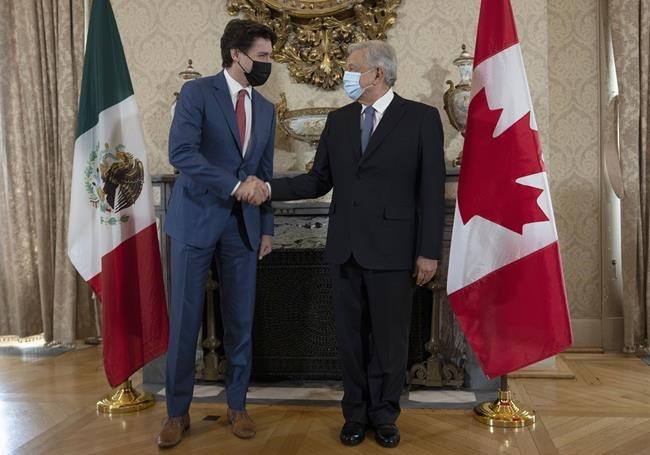OTTAWA — President Andrés Manuel López Obrador is keen to engage Prime Minister Justin Trudeau on finding ways to heal relations with Indigenous Peoples in his country, says the Mexican ambassador to Canada.
López Obrador says Canada and Mexico can share experiences on healing their respective relationships with Indigenous Peoples, Juan José Gómez Camacho, the Mexican envoy, told The Canadian Press.
"Something that Prime Minister López Obrador will be keen to share with Prime Minister Trudeau is all the social policies that he has been putting forward to bring Indigenous people to the centre of government efforts," Gómez Camacho said in an interview from Mexico City this week prior to their Washington summit with U.S. President Joe Biden.
Trudeau and López Obrador met face-to-face for the first time in Washington on Thursday before taking part in the first North America Leaders' Summit in five years, hosted by Biden.
The so-called Three Amigos are pursuing an ambitious post-COVID-19 economic agenda to make North America more resilient against the pandemic's global aftershocks, including a snarled international supply chain.
American officials say part of that agenda will include a Biden-driven initiative to create a North American working group on violence against Indigenous women and girls.
Gómez Camacho said López Obrador is more than ready to engage directly with Trudeau on the issue because both of them have placed Indigenous reconciliation at the centre of their agendas.
Since coming to power in 2015, Trudeau's reconciliation with Indigenous Peoples has faced obstacles, including his government's ongoing court battle to prevent mandatory compensation of Indigenous children, as well as the aftermath from the finding of hundreds of mass graves at the sites of former Indian Residential Schools this year.
This past summer, López Obrador asked Mexico's Indigenous population for forgiveness as the country marked the 500-year anniversary of the fall of the Aztecs to Spanish invaders. But he later faced criticism for his apology to Mexico's Yaqui people, whom he has described as the country's most persecuted Indigenous group.
The Yaquis faced a government campaign to exterminate or exile its members around 1900, and of late have endured mass killings and high death rates due to COVID-19.
"Indigenous people in Mexico have been discriminated against, have been marginalized, and have been the last car in the train. So, there's lots of effort to bring them to the front again," Gómez Camacho said.
While both countries face different challenges in addressing the issue, Gómez Camacho said there are "enormous potential lessons" for both leaders to learn from each other, he said, adding there are "lots of things that President López Obrador would love to share with the prime minister."
Ahead of Thursday's trilateral summit in Washington, American officials said North American economic competitiveness requires "equity and justice" and "having a pledge to create a North American partnership for racial equity and inclusion." That has led Biden to seek the creation of a trilateral working group on violence against indigenous women and girls.
When the North American leaders last met in Ottawa in 2016, a similar framework was announced, but it was essentially shelved when Donald Trump succeeded Barack Obama at the White House.
Foreign Affairs Minister Mélanie Joly joined Gómez Camacho in Mexico City earlier this week before travelling to Washington for the leaders' summit. Joly met her counterpart, Marcelo Ebrard, and the two discussed Canada's feminist foreign policy as well as Indigenous reconciliation, according to a readout from her office.
Joly also met with female Mexican Indigenous leaders in an encounter she later described as "meaningful" in a Twitter post.
"There is much our countries can collaborate on as we seek to advance rights, truth and reconciliation with Indigenous peoples in Canada and in Mexico," Joly tweeted.
This report by The Canadian Press was first published Nov. 18, 2021.
Mike Blanchfield, The Canadian Press




